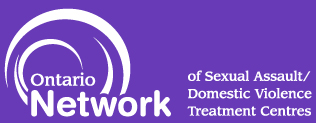

Mandate
The mandate of the Sexual Assault/Domestic Violence Treatment Centres is to address the health, psycho-social, and forensic needs of victims/survivors of sexual violence and/or domestic violence in a prompt, professional, and compassionate manner.
Statement of Philosophy
The Ontario Network of Sexual Assault/Domestic Violence Treatment Centres is committed to operating from a feminist analysis of violence which recognizes the embedded social, cultural, and systemic imbalances within society that promote and maintain violence. As such, we recognize the importance of promoting choice, respect, and empowerment, while honouring differences.
Vision
A unifying voice and catalyst for change in responding to the health, forensic, and psycho-social needs of those who have experienced sexual violence and/or domestic violence.
Mission
To provide leadership and support through advocacy, education, and research to thirty-seven hospital-based sexual assault and domestic violence treatment centres across Ontario.
Core Values
-
All individuals have a right to a life free of violence.
-
Women are disproportionately affected by domestic violence and sexual violence, as evidenced by research. As such, we recognize that violence is gender-based, wide-spread, and a human rights violation. It reflects and reinforces inequities and compromises the health, dignity, security, and autonomy of its victims/survivors.
-
Sexual violence and domestic violence have long-term negative impacts on individuals, families, and society.
-
Sexual violence and domestic violence are crimes and individuals who use violence against others need to be held accountable.
-
Sexual violence and domestic violence must be addressed collectively by the health care, legal, social, and political systems.
-
Everyone has the right to services to aid in their recovery.
-
Services must be accessible and staff appropriately trained to provide care to all community members.
-
Access to trauma specific services can mitigate harm and facilitate healing and post-traumatic growth.
Principles of Service
Inclusion and Equity
Everyone has the right to effective, equitable and timely services.
Client-Centred
Our services must be individualized, culturally appropriate, accessible, consistent, sensitive and nonjudgmental.
Informed Choice
Information must be delivered in a timely, accessible, and responsive way to facilitate a client's right to make informed choices.
Education
Professional development and ongoing education are crucial to delivering quality services by competent professionals.
Collaboration
Collaboration and networking encourage information exchange, reduce isolation and facilitate resource sharing.
Accountability
Centres and professionals demonstrate accountability to the clients receiving our services and to our funding bodies through data collection, program evaluation, and the delivery of quality, evidence-based services.
Trauma Specific Services
Each SA/DVTC will provide trauma-specific services.